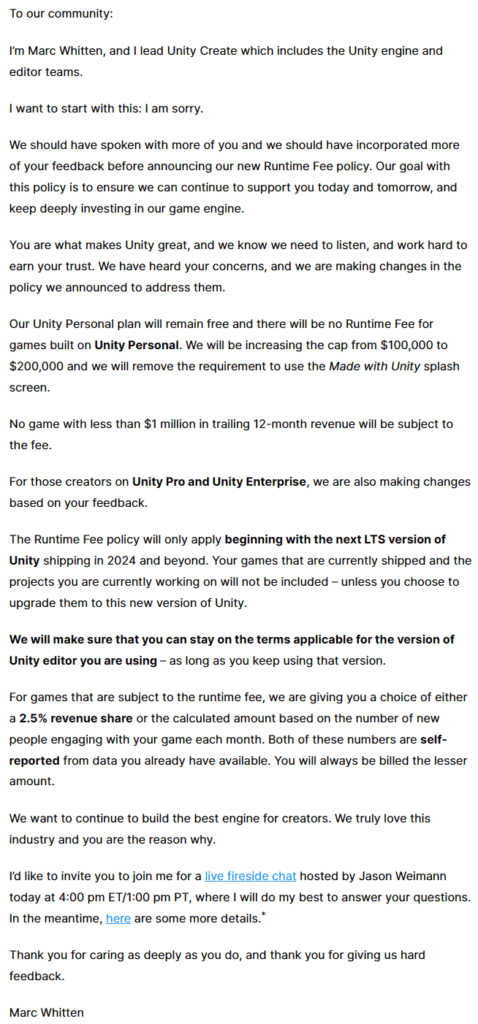So, it’s been 10 days since the Unity Runtime Fee debacle started, and over a week since I sent my own election to not be impacted over the changes, and Unity have… caved? There’s still no response from the ticket, but according to their Zendesk update, the queue time has gone from a week to 2 months 🤯- I can’t think of a reason why 😉

Seemingly there is no way to close a ticket once it’s opened from our end, so who knows when that will get back to normal, but with the updates proposed in Unity’s open letter that have taken an age to be made in internet terms, things will be OK – That doesn’t necessarily mean that I’ll be using Unity in future, but who knows?
The Unity Open Letter

I’ve not gone into depth so there will be many better sources out there than me, but this leaves the door open to do what they did again, once the backlash is mostly forgotten. If the hundreds of employees and industry “insiders” and common sense didn’t prevail I’m not sure how talking to more people about the changes would have made any difference.
There’s also talk of earning trust… hmmm. The main plus side of this letter is that Unity Personal will now have a revenue limit of $200,000/year and that you will be able to remove the Unity logo on that free plan from LTS 2023.x (releasing in 2024, probably) and that no games that have made less than $1,000,000 in gross revenue in the last 12 months will be impacted, that those fees are capped at 2.5% and that all figures are self-reported.
How does Unity compare to Unreal now?
It’s a bit complicated, it depends on your business, how many employees you have and how much you make as a business and on the game in question.
As you can see from the table below, if none of your games break $1,000,000 a year, then Unity will still charge you for a Unity Pro license per developer, whereas Unreal is 100% free until you break that threshold. After that though things reverse, unity will charge around 2.5% plus the fees (and the fees you’ve already paid) and unreal takes a straight 5% cut.
| Unity Free | Unity Pro | Unreal | |
|---|---|---|---|
| Yearly cost (per seat) | $0 | ~$2,000 | $0 |
| Revenue Limit (per entity) | $200,000 | n/a | n/a |
| Revenue Free (per game) | n/a | $1,000,000 | $1,000,000 |
| Revenue Fee (a.k.a Royalty) | n/a | 2.5% | 5% |
Unity is still easy to get into, even if things are a bit of a mess, but there are alternatives.
What about other engines?
There are a ton out there, and I’m not going to list or link to them all here, but I’m looking at Godot (however you pronounce it) – It has 2D, 3D, seems easy to transfer knowledge from and even (from the scarce resources about it out there) supports building native VR apps for the Meta Quest 2.
Have fun out there and make up your own mind 😊

